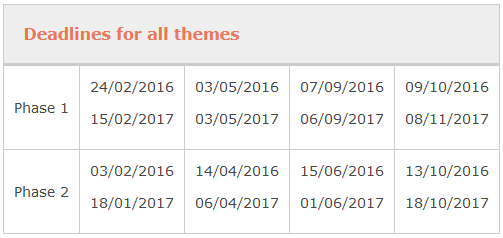
New calls open under the SME Instrument 2016-2017
EU funding opportunities 7 December 2015On 26 November, the submission period for project proposals under the new themes of the SME Instrument 2016-2017 has been opened.
As part of Horizon 2020, the SME Instrument aims at transforming disruptive project ideas into concrete and innovative solutions with a European and global impact, and at giving support to small and medium enterprises tackling the challenge of bringing ideas “from lab to market“. The ultimate goal is therefore to strengthen the competitiveness of European businesses, create new jobs, develop new brands and patents, and boost economic growth.
For the period 2016-2017, the European Commission made available 200 million of euro more than in the previous biennium of the SME Instrument.
European SMEs will thus benefit from a total budget of about 740 million euro, of which 353.4 million euro for 2016 and 386 million euro for 2017, distributed among the following 13 subjects:
• SMEInst-01-2016-2017: Open Disruptive Innovation Scheme
• SMEInst-02-2016-2017: Accelerating the uptake of nanotechnologies advanced materials or advanced manufacturing and processing technologies by SMEs
• SMEInst-03-2016-2017: Dedicated support to biotechnology SMEs closing the gap from lab to market
• SMEInst-04-2016-2017: Engaging SMEs in space research and development
• SMEInst-05-2016-2017: Supporting innovative SMEs in the healthcare biotechnology sector SMEInst-06-2016-2017: Accelerating market introduction of ICT solutions for Health, Well-Being and Ageing Well
• SMEInst-07-2016-2017: Stimulating the innovation potential of SMEs for sustainable and competitive agriculture, forestry, agri-food and bio-based sectors
• SMEInst-08-2016-2017: Supporting SMEs efforts for the development – deployment and market replication of innovative solutions for blue growth
• SMEInst-09-2016-2017: Stimulating the innovation potential of SMEs for a low carbon and efficient energy system
• SMEInst-10-2016-2017: Small business innovation research for Transport and Smart Cities Mobility 12 SMEInst-11-2016-2017: Boosting the potential of small businesses in the areas of climate action, environment, resource efficiency and raw materials
• SMEInst-12-2016-2017: New business models for inclusive, innovative and reflective societies
• SMEInst-13-2016-2017: Engaging SMEs in security research and development
Further details about the specific challenges addressed by each topic are available in the official Work Programme 2016-2017 “Innovation in SMEs”.
Only a single for-profit SME or a consortium of for-profit SMEs can apply for funding. All applicants need to be legally established in one of the Member States or in a country associated to Horizon 2020. Other partners, such as research providers or larger companies, can be involved as third parties, usually in a subcontracting relationship.
The instrument will unfold in three phases; SMEs can apply for funding for Phase 1 and Phase 2 within the four deadlines established all year round, as summarized in the table below.

Source: ec.europa.eu
Under phase 3, participating SMEs will be able to draw on a range of services that will assist them in upgrading their financial readiness for further developing their business and shaping their market.
Phase 1. Concept & Feasibility Assessment
For the idea to concept (6 months), the European Union will provide 50.000 euro in funding, and carry out a feasibility study to verify the viability of the proposed disruptive innovation or concept. The SME will draft an initial business proposal (around 10 pages).
Phase 2. Demonstration, Market Replication, R&D
For the concept to market-maturity (1-2 years), assisted by the EU, the SME will further develop its proposal through innovation activities, such as demonstration, testing, piloting, scaling up, and miniaturisation. It will also draft a more developed business plan (around 30 pages).
Proposals will be based on a business plan developed on phase 1 or otherwise. The EU aims to contribute between 0.5 and €2.5 million euro.
Phase 3. Commercialisation
For the preparation for market launch, SMEs will receive extensive support, training, mentorship and facilitating access to risk finance as the project is further polished into a marketable product. The EU will not provide direct funding in this phase; however, additional support and networking opportunities will be provided by Enterprise Europe Network (EEN).
All information and official documents regarding the call for proposals under the SME Instrument 2016-2017 are available in the dedicated section of the Participant Portal.







